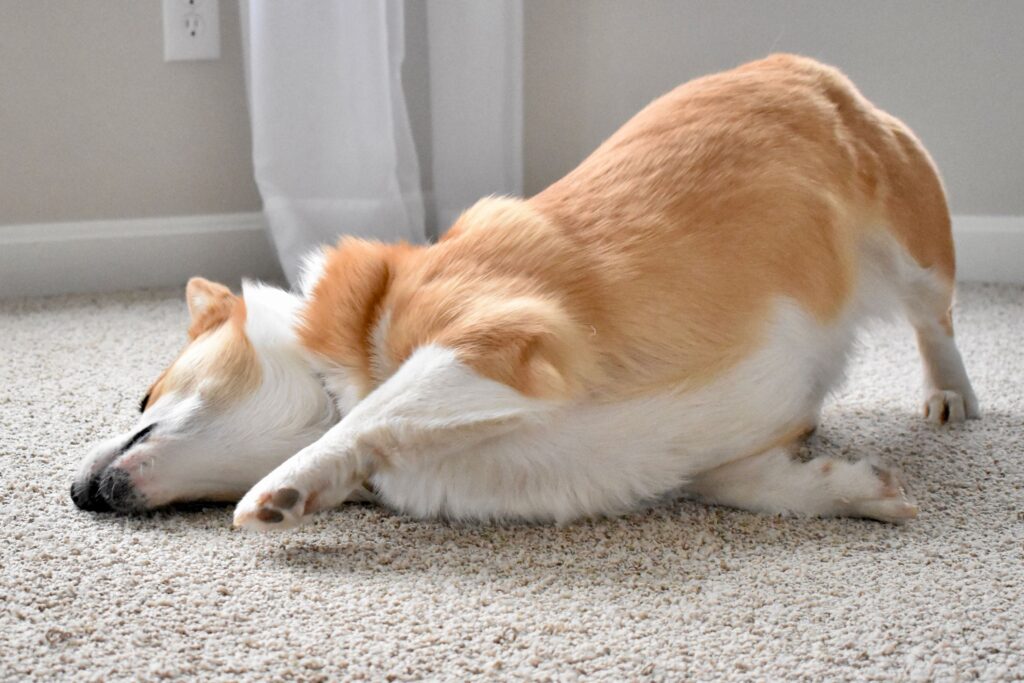Your cat may be peeing on your shoes due to territorial marking or a medical issue.
Contents
- 1 The Psychology Behind Inappropriate Elimination
- 2 Common Triggers For Shoe-soiling Cats
- 3 Ways To Address And Prevent Shoe Peeing
- 4 Identifying And Resolving Underlying Issues
- 5 Implementing Behavior Modification Techniques
- 6 Navigating Medical Causes And Treatments
- 7 Maintaining A Cat-friendly Environment
- 8 General Tips For Cat Owners
- 9 Frequently Asked Questions For Why Is My Cat Peeing On My Shoes? You Have To Be Kitten Me…
- 10 Conclusion
The Psychology Behind Inappropriate Elimination
The psychology behind inappropriate elimination in cats can be complex, but understanding the reasons behind this behavior is crucial in order to address the issue effectively. Feline urine marking, which often manifests as peeing on shoes, is commonly driven by the territorial instinct. Cats have a natural urge to mark their belongings, including items that carry the scent of their owners. This behavior is a way for them to establish their territory and communicate their presence to other cats.
Stress and anxiety can also lead to shoe-soiling in cats. When cats feel stressed or anxious, they may engage in this behavior as a way to cope with their emotions. Changes in the environment, such as moving to a new home or the introduction of a new pet, can trigger these feelings of stress and anxiety.
To address and prevent this behavior, it is important to provide cats with a safe and secure environment. This includes ensuring they have access to their own designated areas and providing them with plenty of mental and physical stimulation. Additionally, consulting with a veterinarian or animal behaviorist can provide further guidance on how to address the underlying causes of inappropriate elimination.
Common Triggers For Shoe-soiling Cats
Are you puzzled about why your cat insists on using your shoes as a bathroom? Rest assured, you’re not alone in this frustration. Cats may engage in shoe-soiling behavior due to various triggers, all of which can be resolved with some investigation and timely action.
A common reason behind this behavior lies in litter box issues. Cats are known for their cleanliness, so if they’re peeing on your shoes, it might be a signal that something is amiss with their litter box. It’s important to identify and address any problems, such as an unclean litter box, an uncomfortable location, or even the litter itself not meeting their preferences.
Another trigger for shoe-soiling can be environmental changes. Cats can become stressed or anxious when their surroundings are altered, such as moving to a new house or rearranging furniture. This upheaval can lead to behavioral issues, including peeing on shoes.
Additionally, medical conditions should not be disregarded as potential contributors. Various health issues, like urinary tract infections or bladder stones, can cause discomfort and alter a cat’s bathroom habits, resulting in shoe-soiling behavior.
To effectively address this issue, it’s essential to determine the root cause and take appropriate steps. By ensuring a clean and comfortable litter box, minimizing environmental changes, and promptly seeking veterinary care when needed, your cat will hopefully bid adieu to using your shoes as their personal restroom.
Ways To Address And Prevent Shoe Peeing
Establishing a proper litter box routine is essential for addressing and preventing shoe peeing. Ensure that the litter box is clean and easily accessible to your cat. Scoop the litter box daily and change the litter regularly to maintain cleanliness.
Introducing environmental enrichment can help reduce stress, which may be a contributing factor to shoe peeing. Provide your cat with toys, scratching posts, and interactive play sessions to keep them mentally and physically stimulated.
Behavioral training techniques can be effective in redirecting undesirable behavior like shoe peeing. Use positive reinforcement by rewarding your cat when they use the litter box correctly. Consider using deterrents like double-sided tape or aluminum foil to deter your cat from peeing on your shoes.
| Key Points |
|---|
| Proper Litter Box Routine: Keep the litter box clean and easily accessible. |
| Environmental Enrichment: Provide toys and interactive playtime to reduce stress. |
| Behavioral Training Techniques: Use positive reinforcement and deterrents to redirect shoe peeing. |
Identifying And Resolving Underlying Issues
Identifying and resolving the underlying issues causing your cat to pee on your shoes can be a challenging but essential task. By observing their behavior, addressing potential medical conditions, and providing a suitable litter box environment, you can effectively tackle this problem and restore harmony in your home.
| Identifying and Resolving Underlying Issues |
| If you find your cat peeing on your shoes, it could be a sign of underlying issues that need attention. Seeking veterinary advice is crucial to ensure your cat’s wellbeing. Consult a veterinarian about the issue if you notice this behavior persisting. They can help identify any medical conditions or behavioral problems that may be causing it. Analyzing your cat’s environment for potential stressors is another important step. Look for any changes in their surroundings or household dynamics that might be making them anxious. Evaluating any recent changes in household dynamics, such as new pets or people, can provide insights into the possible triggers. By addressing these underlying issues, you can help stop your cat from peeing on your shoes and foster a healthier environment for them. |
Implementing Behavior Modification Techniques
The reasons behind a cat peeing on shoes can be various, but implementing behavior modification techniques can help address this issue effectively.
One approach is to utilize positive reinforcement training methods. By rewarding desired behaviors such as using the litter box or avoiding shoes, cats can learn to associate these actions with positive outcomes. Using treats, affection, or playtime as rewards can be highly effective.
Another strategy is to introduce pheromone diffusers and calming aids into the environment. Pheromone diffusers emit synthetic versions of feline facial pheromones, which can help create a calming and stress-free atmosphere. Calming aids like supplements or sprays can also be beneficial in reducing anxiety and promoting good behavior.
It is also advisable to seek guidance from a professional animal behaviorist. These experts can provide invaluable insights into a cat’s behavior, reasons behind inappropriate urination, and offer personalized techniques to reinforce desired behaviors and discourage shoe peeing.
Inappropriate elimination is a common issue among cats, and one perplexing behavior is peeing on shoes. It’s important to rule out any medical causes before jumping to conclusions. When diagnosing the cause, veterinarians perform various diagnostic procedures to determine if underlying health issues are to blame. These procedures may include urine analysis, blood tests, radiographs, and ultrasounds. Once a medical condition is identified, appropriate treatment options and management strategies can be implemented. Understanding common medical conditions that may lead to inappropriate elimination is crucial. Some of these conditions include urinary tract infections, bladder stones, urinary blockages, kidney disease, and diabetes. Treatment may involve medication, dietary changes, environmental modifications, or a combination of these approaches. Working closely with your veterinarian can help identify and address the root cause of your cat’s behavior, ensuring their health and well-being.
Maintaining A Cat-friendly Environment
Creating a stimulating and cat-friendly environment is crucial for preventing inappropriate urination, such as peeing on shoes. Cats need mental and physical stimulation to keep them engaged and satisfied. This can be achieved by providing various forms of enrichment, such as interactive toys, scratching posts, and climbing trees. Additionally, ensuring proper litter box hygiene is essential. The litter box should be easily accessible and placed in a quiet and secure location. It’s recommended to have one litter box per cat, plus an additional one. Minimizing stressors and maintaining a consistent routine also play a vital role in preventing urine marking. Cats are creatures of habit, so any changes in their surroundings can cause stress and lead to inappropriate elimination. By creating a secure and consistent routine, cats feel more confident and secure in their environment, reducing the likelihood of peeing on shoes or other objects.

Credit: www.reddit.com
General Tips For Cat Owners
Establishing a routine for playtime and interaction is vital in preventing behavioral issues in cats, such as peeing on shoes. Cats need mental and physical stimulation to keep them engaged and satisfied. Allocating dedicated play sessions with toys and activities they enjoy can help prevent boredom and redirect their energy. Positive reinforcement, such as treats or praise, for desired behaviors like using the litter box encourages cats to continue engaging in those behaviors.
Another crucial aspect of cat care is regular veterinary check-ups. These check-ups not only help monitor their overall health and well-being but also ensure any potential medical issues, such as urinary tract infections or bladder disorders, are identified early. Cats are masters at hiding discomfort or pain, so routine examinations are essential in detecting and addressing any underlying health concerns.
Frequently Asked Questions For Why Is My Cat Peeing On My Shoes? You Have To Be Kitten Me…
Why Has My Cat Started Peeing On My Shoes?
Your cat may be peeing on your shoes due to territorial marking or a urinary issue. Provide a clean litter box, keep shoes out of reach, and consult a vet if the behavior continues.
Why Do Cats Pee On Certain Peoples Clothes?
Cats pee on certain peoples clothes due to territorial marking or stress-related issues. They use their urine to claim ownership or communicate their anxiety. Providing litter boxes, reducing stressors, and consulting a veterinarian can help resolve this behavior.
Why Cats Pee Where They Shouldn T?
Cats may pee outside the litter box due to various reasons such as medical issues, territorial marking, stress, or dislike for the litter box. Identifying the cause and addressing it can help resolve this problem. Regular vet check-ups and behavioral interventions can help prevent inappropriate peeing.
Why Did My Cat Spray On My Clothes?
Cats spray on clothes due to territorial marking, stress, or hormonal changes. To prevent this behavior, provide enough litter boxes, ensure a clean environment, and offer stress relief options like playtime or calming pheromones.
Conclusion
Dealing with a cat peeing on your shoes can be frustrating, but understanding the reasons behind this behavior is crucial. Whether it’s a territorial issue, a medical condition, or a case of stress, it’s essential to address the underlying cause to find a solution.
By providing a clean litter box, ensuring a stress-free environment, and seeking veterinary advice, you can help prevent your feline friend from turning your shoes into their personal bathroom. Remember, with a little patience and understanding, you can overcome this challenge and maintain a harmonious relationship with your furry companion.

Katie Lindsey is a passionate cat lover and founder of Cats Solution, a comprehensive resource for all things feline. With a lifelong love for cats and extensive knowledge in their care and behavior, she provides expert advice and solutions to cat owners. Through her website, Katie fosters a supportive community where cat enthusiasts can find guidance and heartwarming stories. A dedicated advocate for animal welfare, Katie also promotes responsible pet ownership and adoption. Join her on this purr-fect journey celebrating the joy of feline companionship.



